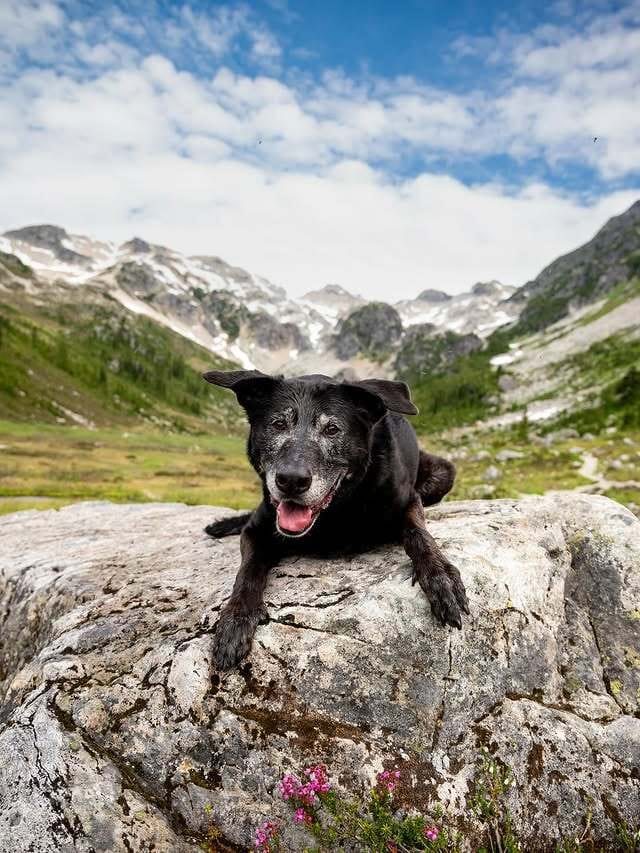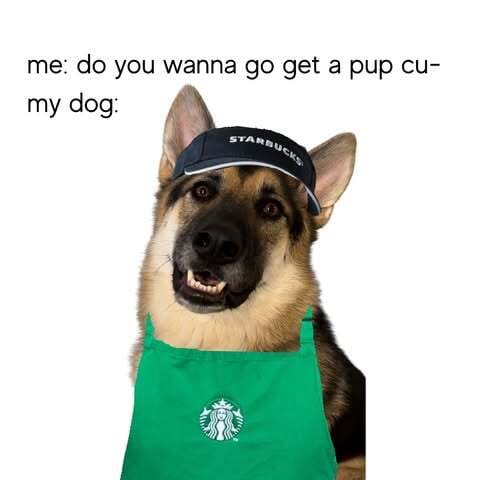Your daily dose of doggy goodness!
Every day, we celebrate our shared love of dogs and hopefully brighten your day. Enjoy!
Dog of the Day: Maizee!
Meme of the day: Pup cups for everyone!
America’s Animal Rescue Giveaway!
Get ready to wag your tails because I Love Every Dog is amplifying the love for our four-legged friends by celebrating the incredible heroes who dedicate their lives to saving them! In an exciting new initiative, we're partnering with Animal Actions to honor the vital work of animal rescues. We'll be donating up to $10,000 to a deserving animal rescue chosen by a random draw. Imagine the impact that could have on countless lives!
Older Pup Mannerisms
Aging is a natural part of life, and just like humans, dogs experience a range of behavioral changes as they get older.While some shifts are simply a part of the aging process, others can signal underlying health issues. Understanding these changes can help you provide the best possible care for your senior canine companion.

Increased Sleeping and Decreased Activity
One of the most noticeable changes is a general slowdown. Your once-energetic pup might spend more time napping and less time playing fetch. They might be less enthusiastic about long walks or may tire more easily during their usual activities. This decrease in activity is often due to joint pain, muscle weakness, or decreased stamina.
Changes in Interaction
Some senior dogs become more clingy and seek out more attention and physical contact from their owners. Others might become more irritable or withdrawn, preferring solitude and reacting negatively to being disturbed, especially if they are in pain or have hearing/vision loss. They might be less tolerant of boisterous children or other pets.
Altered Sleep-Wake Cycles
It's common for older dogs to experience disruptions in their sleep patterns. They might sleep more during the day but become restless or disoriented at night, often pacing, whining, or barking. This can be a sign of canine cognitive dysfunction (CCD), similar to Alzheimer's in humans.
House-Soiling Accidents
Even perfectly house-trained dogs can start having accidents indoors as they age. This can be due to a variety of factors, including decreased bladder control, increased frequency of urination (often due to kidney issues or diabetes), or simply not being able to hold it as long due to mobility issues preventing them from getting outside in time.
Increased Vocalization
You might notice your older dog barking, whining, or howling more frequently, often without an obvious trigger. This can be related to disorientation from CCD, anxiety, or pain. If your dog seems to be vocalizing more, it's worth a vet visit to rule out medical causes.
Confusion and Disorientation
This is a hallmark sign of CCD. Dogs with cognitive dysfunction might seem lost in familiar surroundings, stare blankly at walls, forget commands they once knew, or have trouble navigating obstacles. They might also forget routines or seem to forget who their family members are.
Changes in Appetite and Thirst
While not strictly behavioral, changes in eating and drinking habits can influence behavior. Some older dogs might experience a decreased appetite due to dental issues, organ problems, or a decreased sense of smell. Others might have an increased appetite (e.g., due to diabetes) or increased thirst (e.g., due to kidney disease or diabetes).
Increased Anxiety or Fear
As dogs age, they can become more prone to anxiety, especially separation anxiety, or develop new fears of things that never bothered them before, like thunderstorms or loud noises. This can be due to a decline in their senses, making them feel more vulnerable, or changes in brain function.
When to Seek Veterinary Advice
While some of these changes are a normal part of aging, it's always best to consult your veterinarian if you notice significant shifts in your dog's behavior. Many of these behaviors can be symptoms of underlying medical conditions such as arthritis, kidney disease, thyroid issues, diabetes, or even tumors. Early diagnosis and treatment can significantly improve your dog's quality of life.
Even if the changes are due to normal aging or CCD, your vet can offer advice on pain management, nutritional adjustments, environmental modifications, and even medications that can help manage cognitive decline.
Supporting Your Senior Dog
Understanding and responding to these changes with patience and compassion is key. Providing a comfortable, predictable environment, maintaining a consistent routine, and making adjustments to their daily life can help your senior dog navigate their golden years with dignity and comfort. Celebrate their wisdom and cherish the slower pace, knowing you're providing them with the loving care they deserve.
Dog Food and Supplement Recalls
Here are the recent recalls and advisories:
Savage Pet - Cat Food Chicken for potential bird flu exposure
Wild Coast Raw - Frozen Boneless Free Range Chicken Formula raw pet food for cats for possible bird flu exposure.
Blue Ridge Beef - Natural Mix for potential salmonella.
The Smile Section
Family Photo of the Day:
Sophie!

We want to feature your pup!
We want to share your pup with our pack. Email us your favorite doggy pic or video with your pup’s name, and we'll try to feature it as a family photo in one of our upcoming newsletters or on our Facebook page.
Interested in reaching our audience?
Like newsletters?
Here are some newsletters our readers also enjoy:
Share our newsletter with your friends!
We’ll donate on your behalf!
🐶 Refer 10 people: We will donate a box of treats to an animal rescue 🐶
🐶 Refer 50 people: We will donate a bag of dog food to an animal rescue 🐶
🛏 Refer 100 people: We will donate a dog bed to an animal rescue 🛏
{{rp_personalized_text}}




